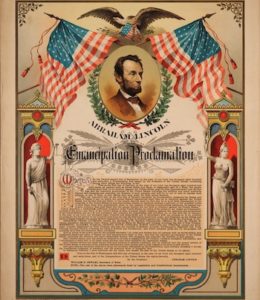
Emancipation Proclamation (copy)
*On this date in 1863, President Abraham Lincoln signed the Emancipation Proclamation, ordering that all slaves in rebel territory be freed.
This document marked a radical exodus in then-American policy, reflecting the public sentiment in the North. About 4 million Black African people gained freedom under the terms of the Proclamation, which is regarded as one of the most important documents of the United States. After the American Civil War started, the slavery issue was heightened by the escape to Union lines of large numbers of slaves who volunteered to fight for their freedom and that of their fellow slaves.
In these circumstances, a strict application of the established policy would have required the return of fugitive slaves to their Confederate masters and alienated the staunchest supporters of the Union cause in the North and abroad. Abolitionists had long been urging Lincoln to free all slaves, and public opinion supported this view. He moved slowly and cautiously nonetheless; on March 13, 1862, the federal government forbade all Union army officers to return fugitive slaves, thus annulling the fugitive slave laws. On April 10, on Lincoln's initiative, Congress declared the federal government would compensate slave owners who freed their slaves.
All slaves in the District of Columbia were freed on April 16, 1862. On June 19, 1862, Congress endorsed a measure prohibiting slavery in United States territories, thus defying the Supreme Court decision in the Dred Scott case, which ruled that Congress was powerless to regulate slavery in the territories. Finally, after the Union victory in the Battle of Antietam on September 17, 1862, Lincoln issued a preliminary proclamation on September 22, declaring his intention to circulate another proclamation in 100 days, freeing the slaves in the states deemed in rebellion. On January 1, 1863, he issued the Emancipation Proclamation.
The 13th Amendment to the U.S. Constitution became effective in 1865, completely abolishing slavery. The Emancipation Proclamation's results were far-reaching. The Lincoln Party (Republican) became unified in principle and organization, and the prestige it attained enabled it to hold power until 1884.